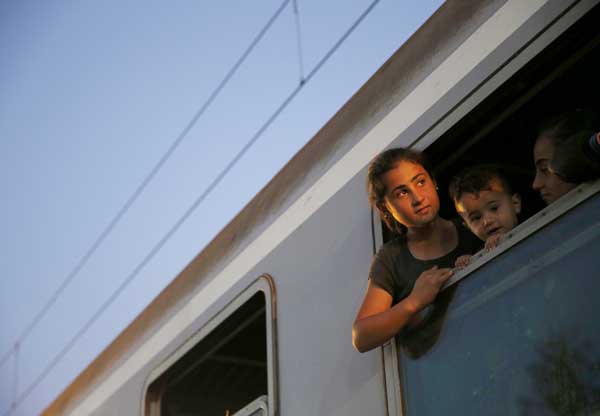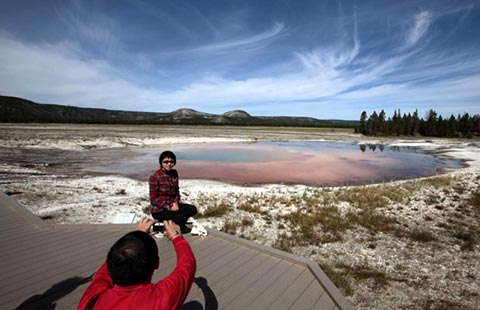EU pushes through plan to relocate 120,000 refugees amid oppositions
Updated: 2015-09-23 10:36
(Xinhua)
|
||||||||
 |
|
Migrants look out from the window of a train as they wait to depart from the railway station in Tovarnik, Croatia, September 21, 2015. [Photo/Agencies] |
BRUSSELS - The governments of European Union (EU) member countries approved the proposal to relocate 120,000 migrants by a majority vote on Tuesday amid fierce oppositions from several countries in central and eastern Europe.
The European Commission has proposed resettling the 120,000 refugees on top of the 40,000 refugees that member states have already agreed to relocate from EU countries exposed to massive migratory flows.
Home affairs ministers of EU member states gathered in Brussels Tuesday for the second time in as many weeks to resolve the dispute over the relocation plan. As EU member states were wildly divided over the issue, the decision was at last pushed through by a vote on Tuesday.
The decision established a temporary and exceptional relocation mechanism over two years from the frontline member states Italy and Greece to other member states, it said in a statement after the meeting.
Following this decision, the EU is now in a position to relocate a total of 160,000 people in clear need of international protection in the coming two years.
According to the decision, 66,000 persons will be relocated from Italy and Greece (15,600 from Italy and 50,400 from Greece). The remaining 54,000 persons will be relocated from Italy and Greece in the same proportion after one year of the entry into force of the decision.
EU said the member states participating in the mechanism will receive a lump sum of 6,000 euros for each relocated person.
However, the plan was outright resisted by some member states, including Britain and several countries in central Europe.
"We, the Slovaks, Romanians, Hungarians [were] against, Finland abstained. The plan was adopted," Czech Interior Minister Milan Chovanec wrote on Twitter after the vote.
The minister said the plan was an "empty political gesture" ahead of the meeting, though he previously said his country was ready to take in thousands of people on a voluntary basis.
Denmark and the United Kingdom are not participating in this decision.
"We would have prepared to have adoption by consensus but we did not manage to achieve that. Some member states did not join this large majority. They pointed out their other legitimate points of view," said Jean Asselborn, Minister for Immigration and Asylum of Luxembourg.
- EU pushes through plan to relocate 120,000 refugees amid oppositions
- China, Malaysia conclude first joint military exercise
- Hillary Clinton opposes controversial oil pipeline
- Washington zoo's panda cub growing up
- World leaders to gather at annual UN meeting
- Tsipras returns to fight for Greek economy
-
 Chinese president lands in Seattle, kicking off US state visit
Chinese president lands in Seattle, kicking off US state visit -
 Special: President Xi visits the US, attends UN summits
Special: President Xi visits the US, attends UN summits 
 Fun stuff you can't miss about China-US exchanges
Fun stuff you can't miss about China-US exchanges
 Who's who at the Sino-US CEOs roundtable
Who's who at the Sino-US CEOs roundtable
 Top 10 favorite destinations of Chinese travelers in US
Top 10 favorite destinations of Chinese travelers in US
 Who accompanies President Xi on foreign visits?
Who accompanies President Xi on foreign visits?
 Americans who helped shape China-US relations
Americans who helped shape China-US relations-
 US buses drive with images of China's pandas
US buses drive with images of China's pandas
Most Viewed
Editor's Picks

|

|

|

|

|

|
Today's Top News
Young people from US look forward to Xi's state visit: Survey
US to accept more refugees than planned
Li calls on State-owned firms to tap more global markets
Apple's iOS App Store suffers first major attack
Japan enacts new security laws to overturn postwar pacifism
Court catalogs schools' violent crimes
'Beauty of Beijing's alleys akin to a wise, old person'
China makes progress fighting domestic, international cyber crime
US Weekly

|

|







